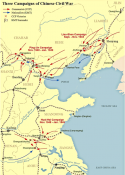Well in my book Lin biao is the best general of Chinese army ever. He only lost one battle in his career Out of 3 deciding campaign to rout Kuomintang army He lead 2 of them. He is dubbed the Napoleon of China As a child I avidly read his exploit. His mystery death is still an enigma . I think the PLA rehabilitate his position as the one of the 8 marshall of Chinese army. He basically won North China for the communist before sweeping south in Huahai campaign
View attachment 79643
There are 2 books on his campaign available with Amazon
Lin Biao,
Lin Piao, original name
Lin Yurong, (born Dec. 5, 1907, Huanggang,
province, China—died Sept. 13, 1971?, Mongolia?), Chinese military leader who, as a field commander of the Red Army, contributed to the communists’ 22-year struggle for power and held many high government and party posts. He played a prominent role in the first several years of the
(1966–76), but in 1971 he allegedly sought to remove Chinese leader
and seize power; his plot was discovered, and he died under obscure circumstances.
Early life and military career
Lin Biao was born of a modest landholding family in Hubei province in central
. He received his
in the village school, then entered middle school in Wuchang, the provincial capital, in 1921. While in middle school, he was deeply affected by the social and cultural upheaval then taking place in his
. He soon became interested in socialism and
, and in 1923 he joined the Socialist Youth League.
In 1925 Lin Biao went south to
(Canton) to enroll in the Whampoa (Huangpu) Academy and there began both his military career and his membership in the
(CCP). China at this time suffered from the twin evils of warlordism and imperialism (i.e., internal disunity and foreign encroachment). In order to fight the warlords and curb the imperialists, the
, led by
until his death in March 1925, had secured the assistance of the
and the cooperation of the CCP and were then preparing a military expedition from their base in Guangzhou. The
, headed by Sun’s successor,
(Jiang Jieshi), was to train the officers for the revolutionary army. Lin had been at the academy less than a year when Chiang launched the
in July 1926. Nevertheless, despite the
of his formal training, Lin quickly demonstrated his military prowess. A few months later, when the expedition reached the
(Chang Jiang) in central China, he had risen from deputy platoon leader to battalion commander. But, when Chiang then turned savagely against his communist allies in 1927, Lin forsook his mentor and fled with the communists.
In
1927 Lin took part in the Nanchang Uprising led by
and other communist leaders. In the spring of 1928, Lin joined Mao Zedong in the hills of south-central China and established himself at once as one of the ablest and most active commanders in Mao’s small but growing
. From 1928 to 1934 he helped to enlarge the communist-controlled territory in
province and defended it against repeated attacks by the Nationalists. In 1932 he was promoted to corps commander. When the communists were finally driven from their Jiangxi base in 1934 by the Nationalists, Lin’s First Army Corps formed the vanguard of the epic retreat known as the
, which a year later brought them to
in the northern province of
, where they were able to regroup. By then the 28-year-old Lin was already a legendary figure with a reputation of never having lost a battle. In Shaanxi he became the president of the Red Army Academy and was among the handful of commanders who ranked just below the important military leaders
and
.
In 1937 the bitter civil war between the Nationalists and the communists ended temporarily as the two sides formed a united front against the common foe,
. In September 1937, just after the outbreak of war, Lin Biao, in command of one of the Red Army’s three divisions, scored an important early victory over the Japanese invaders. He was wounded the following spring and retired from the field for the rest of the war. When his wound did not heal, he went to the Soviet Union for medical treatment and stayed three years. After his return to China in 1942, he served briefly as a member of the communist
team with the Nationalists. In 1943 he resumed the presidency of the Military and Political Academy at Yan’an. As the war with Japan neared its end in 1945, he was elected for the first time to the CCP’s 44-member
.
When
ended, the civil war in China resumed. Returning to the field once more, Lin went to
(Northeast China), as commander of what later became the Fourth Field Army. In a brilliant display of Maoist strategy, he first abandoned the cities of Manchuria to the Nationalists and concentrated instead on securing the support of the peasants in the countryside. Using
, he then patiently and methodically whittled away at his numerically superior enemy. Gradually, he isolated the Nationalists in the cities and eventually forced garrison after garrison to surrender. By the end of 1948, his army, which had originally numbered 100,000, had grown to 800,000, and he had captured all of Manchuria. Lin’s victory in Manchuria ensured the rapid collapse of Chiang Kai-shek’s Nationalists in the rest of China. His own forces, moving south, captured
in January 1949, Wuhan in May, and Guangzhou in October.
Otherwise one would be dumb.

